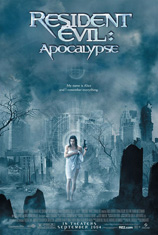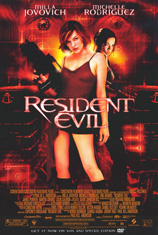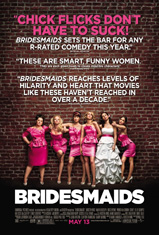
 I'd say that I felt like I'd been a little bit harsh toward Paul W.S. Anderson as a director, were it not for the fact that he wrote this collosal piece of shit.
I'd say that I felt like I'd been a little bit harsh toward Paul W.S. Anderson as a director, were it not for the fact that he wrote this collosal piece of shit.
Everything that was bad about the first film is amped up in its sequel, taking the ludicrous story of a viral zombie outbreak precipitated by the cartoonishly evil and inept Umbrella Corporation (a name that stinks with the dumbshittedness of the Japanese misunderstanding of English) and ham-fistedly turnng it into a 12-year-old boy's wet dream, featuring wooden actors that do things for inexplicable reasons before throwing in "bad ass" stunts that make no logical sense whatsoever. "Wouldn't it be super kick-ass if a badass bitch comes flying through a stained glass window 20 feet in the air on a motorcycle, while running over monsters and flipping through the air, shooting them with machine guns?" No. Not even a little, especially if you're not a teenager whose brain is swimming in too many hormones and backed-up semen to think properly.
I cannot say enough bad things about story that film is supposedly telling. The plot is abject shit, dumbing down the already weak formula of the first movie to provide more action and even less moments of coherence. For example, why are police trying to arrest obvious zombies? And why, then, do none of them seem all that shocked or distressed that a stupidly-scantly-clad suspended officer walks into the building and starts executing their prisoners without a gun being drawn or a harsh word being said? And that's just in the first few minutes. I could give endless examples of why this movie is the most insipidly stupid thing I've watched in some time. What about the viral outbreak that turns the living into zombies somehow causing long-dead corpses to pop up out of their graves for no reason that could possibly ever be explained? Why does Umbrella bother to create absurd biological weapons like Nemesis and then have them fistfight to "test their capabilities" (not that any of its biological weapons projects makes the slightest sense or have any military use whatsoever)? I could go on for hours, but that sensation should be left up to this movie, as it's the expert in that area.
Everything Anderson did poorly in the first film, Alexander Witt does even worse. The direction is awful; the decent performances coaxed out in the first movie are completely dead-eyed and hollow under his instruction in this film; the tone is wretched and dated-looking; the budget looks lower, despite being over $10 fucking million higher; the CGI is nearly as bad in 2004, when it had become relatively cheap and fairly consistent. This truly feels like some horrible 1995 science-fiction film that appears washed-out and cartoonishly flat in its overindulgence and reliance on setpieces. It's no wonder that Witt never directed a movie before or since, but it's strange that such a talented DP could produce such visually-awful product.
Even the decent Manson score is gone in favor of a backwards-feeling orchestral score. Never have I seen a series take such a step backwards and produce something so awful, particularly on a $44 million budget.
Truly, this is everything I was dreading when watching these movies. Anderson is probably one of the worst writers working in the film industry today. It makes me long for Tommy Wiseau's absurd nonsense to take my mind off of the most poorly-constructed assemblage of standard, lazy character archetypes that you can throw together. But at least it's short.


 I was invited to go see the latest Resident Evil atrocity. I knew full well what I was getting into, but I value spending time with friends more than not watching awful movies. Of course, many who know me would insist that those two tend to go hand-in-hand. I figured that if I was going to go see it, I'd do it right and catch up on the previous films so as to get the full "experience".
I was invited to go see the latest Resident Evil atrocity. I knew full well what I was getting into, but I value spending time with friends more than not watching awful movies. Of course, many who know me would insist that those two tend to go hand-in-hand. I figured that if I was going to go see it, I'd do it right and catch up on the previous films so as to get the full "experience".
 Possibly one of the most intriguing and harsh viewing experiences of my life, Sunshine, as shown in the film, manages to bathe you in light. Not just in light, but in sound as well. The whole experiences engulfs the senses until your mind reels and you leave the film, jarred and unsure about your very existance.
Possibly one of the most intriguing and harsh viewing experiences of my life, Sunshine, as shown in the film, manages to bathe you in light. Not just in light, but in sound as well. The whole experiences engulfs the senses until your mind reels and you leave the film, jarred and unsure about your very existance.
 Bridesmaids has gotten praise far and wide, largely comparing it to The Hangover (for women), the most common move in advertising today. Everything is compared to The Hangover because... I don't know. Why is it always The Hangover? It was a passable and amusing comedy, but the constant hype and overestimation of the importance of the film has led to me hating the movie's very existence. "The funniest movie since The Hangover" isn't an impressive statement, even less so when it was being used mere months after the movie's release. And, again, we have a case of a film being drastically overhyped, both in comparison to The Hangover and on its own.
Bridesmaids has gotten praise far and wide, largely comparing it to The Hangover (for women), the most common move in advertising today. Everything is compared to The Hangover because... I don't know. Why is it always The Hangover? It was a passable and amusing comedy, but the constant hype and overestimation of the importance of the film has led to me hating the movie's very existence. "The funniest movie since The Hangover" isn't an impressive statement, even less so when it was being used mere months after the movie's release. And, again, we have a case of a film being drastically overhyped, both in comparison to The Hangover and on its own. Drive is that rare and mythical film that leaves you thinking about the movie for a long time after you walk out of the theater. And this is no Inception; there are no drastic twists or mindfuck plotlines to make you go back over the experience to better understand what you've witnessed. No, this is a straightforward movie paced and stylized in a way that's amazing in its simplicity.
Drive is that rare and mythical film that leaves you thinking about the movie for a long time after you walk out of the theater. And this is no Inception; there are no drastic twists or mindfuck plotlines to make you go back over the experience to better understand what you've witnessed. No, this is a straightforward movie paced and stylized in a way that's amazing in its simplicity.